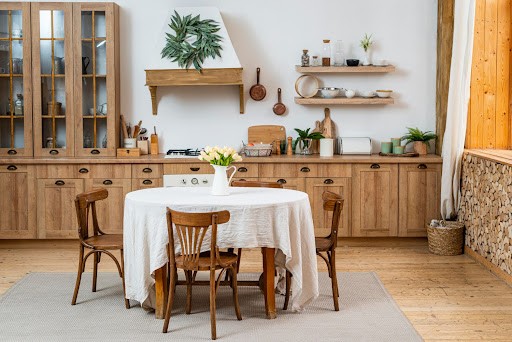Tips for Enhancing Your Dining Room with Wooden Table Legs

The dining room is a focal point of many homes, where families and friends gather to share meals and create memories. The choice of furniture in this space plays a crucial role in setting the tone and ambiance.
Wooden table legs, in particular, can add warmth, elegance, and character to your dining room. In this article, we’ll explore various tips for enhancing your dining room with wooden table legs, covering everything from style and material selection to maintenance and design considerations.
Choosing the Right Wooden Table Legs
Style and Design
When selecting wooden table leg for your dining room, consider the overall style and design theme you want to achieve. For a classic look, opt for turned or carved wooden legs with intricate details. These can add a touch of traditional elegance to your dining space.
Alternatively, if you prefer a more modern aesthetic, sleek and minimalist wooden legs with clean lines might be more suitable. These can complement contemporary dining room decor and create a sense of sophistication.
Material Selection
Wooden table legs are available in a variety of wood species, each with its own unique characteristics. Oak, for example, is known for its durability and prominent grain patterns, making it a popular choice for traditional and rustic dining rooms.
On the other hand, maple offers a smoother, more uniform appearance, ideal for modern and minimalist interiors. Consider the color, grain, and texture of different wood types to find the perfect match for your dining room decor.
Customizing Your Wooden Table Legs
Size and Height
The size and height of your wooden table legs can significantly impact the overall look and feel of your dining table. Standard table height is around 30 inches, but you can customize the length of your table legs to achieve a specific height or accommodate different seating arrangements.
Counter-height tables, for example, are taller and often paired with stools for a more casual dining experience. Ensure that the proportions of your table legs are in harmony with the rest of your dining room furniture for a cohesive look.
Finishes and Stains
Customizing the finish of your wooden table legs allows you to tailor their appearance to suit your preferences. Stains can enhance the natural beauty of wood by adding depth and richness to its color.
Choose a stain that complements the existing wood tones in your dining room, or opt for a contrasting shade to make a bold statement.
Maintaining Wooden Table Legs
Cleaning and Care
Proper maintenance is essential to preserve the beauty and longevity of your wooden table legs. Regular dusting with a soft cloth or feather duster can help prevent the buildup of dirt and grime.
Use a mild wood cleaner or a solution of water and vinegar to gently clean the surface of your table legs. Avoid harsh chemicals or abrasive cleaners that can damage the wood finish.
Preventing Damage
Wooden table legs are susceptible to damage from moisture, heat, and physical impact. To prevent water damage, use coasters or placemats under glasses and dishes to protect the wood surface from spills and heat.
Avoid placing hot items directly on the wooden table legs, as this can cause discoloration or even burns. Use furniture pads or felt protectors on the bottom of chair legs to prevent scratches and dents on the floor and the table legs themselves.
Conclusion
Incorporating wooden table legs into your dining room decor can elevate the aesthetic appeal of the space while adding warmth and charm. By carefully considering factors such as style, material, customization, and maintenance, you can enhance your dining room with wooden table legs that perfectly complement your taste and lifestyle.
Whether you prefer a classic, rustic look or a modern, minimalist vibe, wooden table legs offer endless possibilities for creating a welcoming and stylish dining environment for you and your guests to enjoy.




